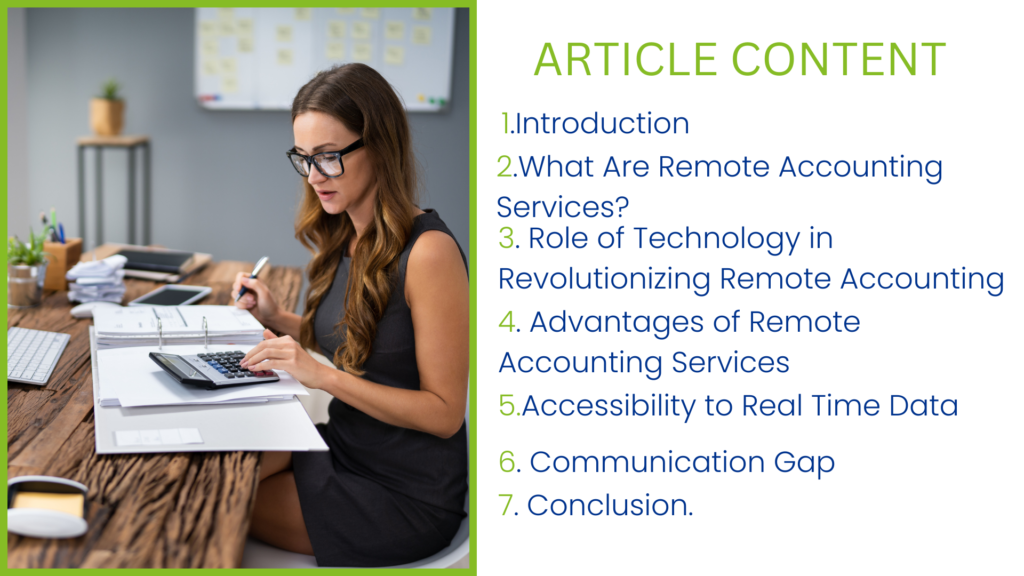Bookkeeping by Mehasa Consulting
- +447513300730
- [email protected]
- W1H London

Remote Accounting Services: Smarter Solutions of Accountancy for Modern Business World
In the business world of the present speed, firms have always competed and strived to run the respective organizations practically and competitively along with cost-effectiveness while ensuring increased growth rates. Traditional accountancy is quite ineffective in most cases or very time-consuming. It requires paper key-in data and uses home-based teams. Now, remote accounting services is this transformational solution involving technology and finance acumen by modernizing and streamlining in the manner of how businesses handle finances; whether it’s overhead or tapped global expertise, remote accounting comes with flexibility, efficiency, as well as real-time insights reshaping the entire method of how companies work.
The financial landscape for businesses-big or small-is undergoing a change with remote accounting. This article talks about them.

What Are Remote Accounting Services?
Remote accounting is the outsourcing of accounting functions by a company to experts or firms that manage these functions off-site, most frequently from other locations. Services include the usual bookkeeping and payroll management but can go as high as financial analysis, tax preparation, and reporting.
Cloud-based software and other communication tools can be used, allowing remote accountants to log in and update the information or even share financial data in real time. The business need for remote accounting services is largely driven by its requirement to decrease the operational cost with professional help from accountants.
With technology, a business can now outsource its accounting to professionals anywhere in the world. This is more cost-effective and flexible than any other alternative to meet rising demands for financial needs.
Role of Technology in Revolutionizing Remote Accounting
Technology has been central in the growth of remote accounting services, where it has ensured that businesses implement more efficient, secure, and scalable accounting systems. Some of the most important ways technology has fueled growth in remote accounting are as shown below.
Cloud Accounting Software
Generally, the cloud-based applications such as Xero, QuickBooks Online, FreshBooks, and Zoho Books replace the traditional means of running accounts in companies. These facilitate both accountants and clients with easy access to update the books at any juncture anywhere in the world to make the accounting easier in terms of reducing probable errors by automatic means and real-time as well.
It would make such a business have options that enable one to get in touch with his accountant remotely through services such as Zoom, Slack, Microsoft Teams, and Google Meet, which facilitate video calls, uploading of files, direct messaging among other things that would make one connect no matter the distance.
Data Storage and Security
Generally, remote accounting deals with sensitive financial information. Due to this, security is a big concern. Solutions such as Google Drive, Dropbox, and many other safe accounting systems can offer encryption, backup storage and strict access controls in order to protect your data from unauthorized access.

Automation and AI
Automation has highly improved the efficiency of remote accounting services. Invoicing, payroll, tax filing, and reconciliation can be automated using high-end software. AI tools assist in anomaly detection, cash flow prediction, and real-time insights that make quick and informed decisions.
Advantages of Remote Accounting Services
A good number of benefits the uptake of remote accounting offers business operations, so it is the right business move for any enterprise irrespective of its size.
Cost Savings
The advantage of remote accounting is saving the money that a business incurs when using in-house accounting staffs. They end up saving on salaries, benefits, office space, and training. One will only pay for what they need, which may come in handy for smaller and medium-sized businesses.
Access to Expertise
Remote accounting gives a business the best minds in the world. Such firms have experts specialized in all fields, meaning the business will have access to knowledge without necessarily having experts in house.

Scalability
Remote accounting services can be scaled up or down. It can increase or decrease accounting services to a business as its size increases or during peak volumes.
Better Flexibility
Remote accounting allows for flexibility in terms of working hours and locations. One can work from anywhere, and differences in time zones are no longer a barrier. This increases work-life balance and simplifies operations across different time zones.
Accessibility to Real Time Data
The business organization’s real-time financial data access through cloud technology will bring about the speeding of faster decision-making, good planning, and quicker response to changes in the market. It makes the business owner have all things in sight and under control, while ensuring transparency.
Better Efficiency
Remote accounting services use automated tools and cloud platforms that enable the process of accounting to be done faster. Automatic invoicing, payroll processing, and tax filing mean there is less human work, and thus less error.
Bottom line: financial data are accurate, and financial management is smooth.
Better Efficiency
Remote accounting services use automated tools and cloud platforms that enable the process of accounting to be done faster. Automatic invoicing, payroll processing, and tax filing mean there is less human work, and thus less error.
Bottom line: financial data are accurate, and financial management is smooth.
How Remote Accounting Overcomes Key Challenges in Businesses
There are many advantages of remote accounting.
However, there are some disadvantages that businesses can overcome in the following ways:
Data Security Issues
One of the significant issues for businesses using remote accounting services is security. Businesses should select accounting firms that employ encryption, have secure cloud storage, and abide by the data protection laws, such as GDPR or CCPA. Multiple factor authentication, as well as strict password policy, will make it even more secure.
Communication Gap
Remote accounting will heavily rely on digital communication, and sometimes this leads to miscommunications. Such a gap can be covered by clear communication protocols such as scheduling regular video calls. In addition, the effectiveness of collaboration tools may come in the form of Slack or Microsoft Teams.
This also creates a challenge in working together over different time zones. The solution to this is for companies to embrace flexible working hours and the use of project management tools that enable asynchronized communication. Clearly set deadlines, maintained organized schedules, and everyone on track.
In fact, it may even lead to quality loss because of the lack of face-to-face supervision. This can be mitigated through clear expectations and regular follow-up through cloud-based portals, frequent check-ins. Businesses should select accounting firms that employ encryption, have secure cloud storage, and abide by the data protection laws, such as GDPR or CCPA. Multiple factor authentication, as well as strict password policy, will make it even more secure.
Communication Gap
Remote accounting will heavily rely on digital communication, and sometimes this leads to miscommunications. Such a gap can be covered by clear communication protocols such as scheduling regular video calls. In addition, the effectiveness of collaboration tools may come in the form of Slack or Microsoft Teams.
This also creates a challenge in working together over different time zones. .
Conclusion
The new wave of remote accounting changes the way businesses operated as they ensure that it gets its finances managed more flexibly, efficiently, and to scale. With this technology being accepted, companies can now automate even the most fundamental processes of accountancy, access real-time data regarding financials, and accordingly derive the needed data-driven decisions with growth on the offing. Whether it is setting up an enterprise or scaling it up, remote accounting offers the most cost-effective as well as the most scalable solution to evolving financial needs. If you are ready to streamline your business finances for better growth, then the next step would be remote accounting services.
Frequently Asked Questions about Remote Accounting Services
Q: How do I transition my company from in-house accounting to remote accounting services?
To transition, review your accounting needs, choose a reputable remote accounting provider, and then transition your financial data to a secure platform. Install communication protocols with your new team to smoothly onboard.
Q: How do remote accounting services keep the data secure?
Responsible companies that work off-site utilize encrypted cloud, multi-factor authentication, and regular backup of data in securing confidential financial details. Such companies will also embrace the international set data protection laws, hence ensuring that confidentiality and safety are attained.
Q: How does remote accounting service integrate into the current business tools?
The cloud-based software most remote accountants use is QuickBooks or Xero, which easily integrates with all other business tools, including CRM systems, inventory management software, and payment processors, which makes the workflow smooth.
